
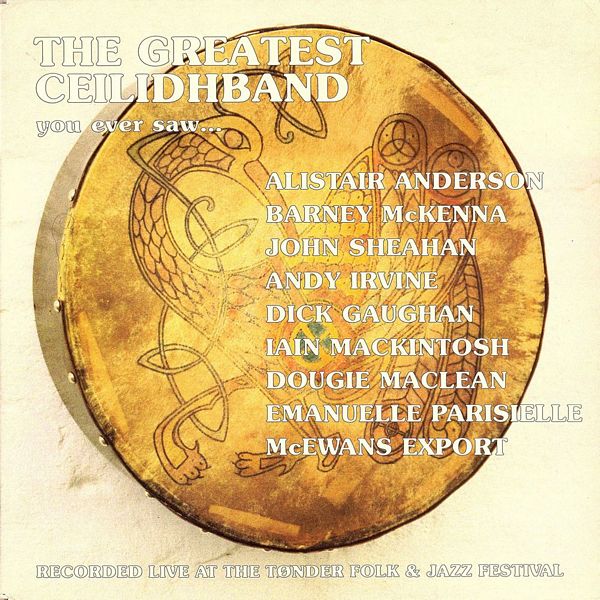 |

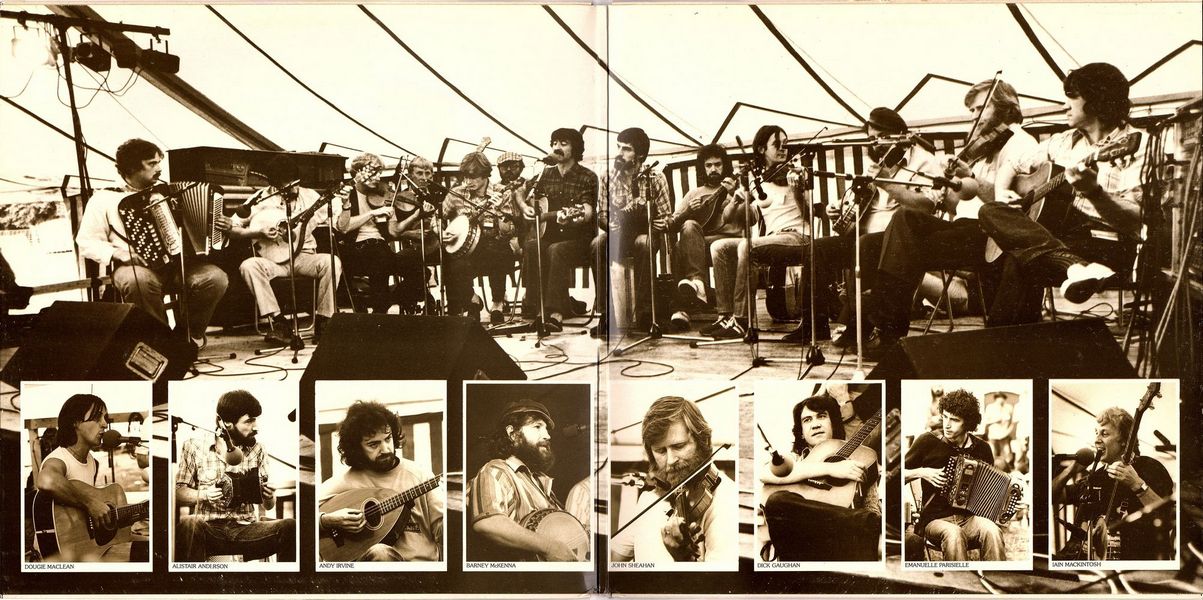
|
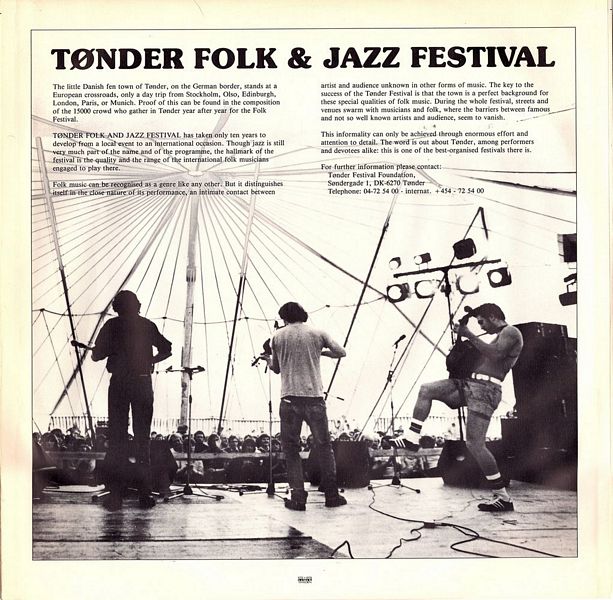
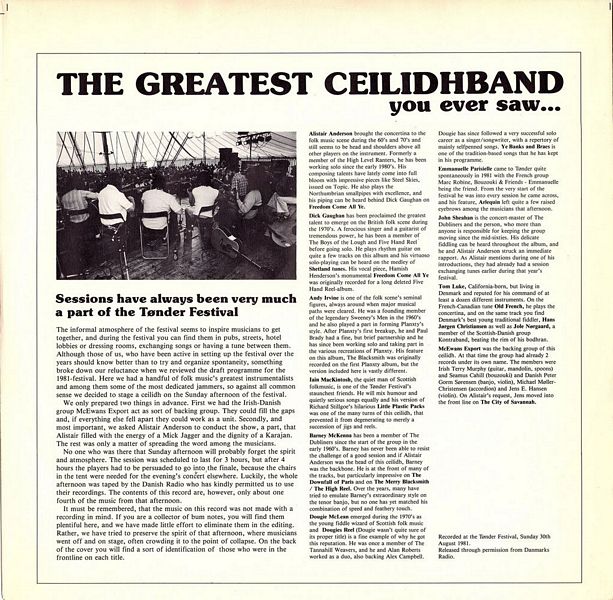
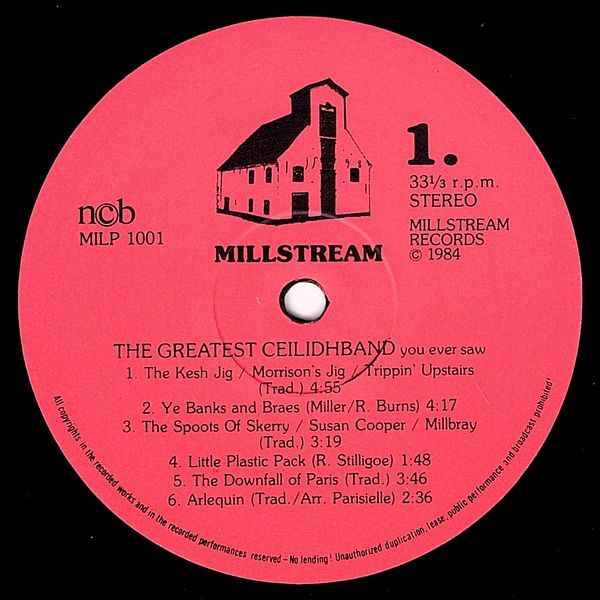
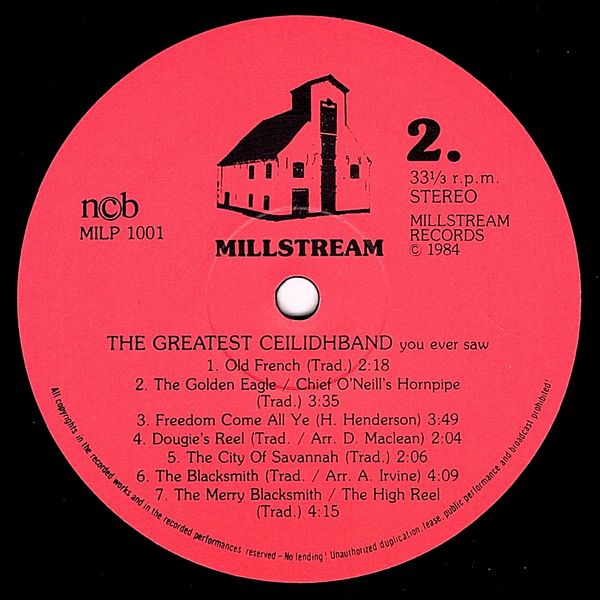
|
The little Danish fen town of Tønder, on the German border, stands at a European crossroads, only a day trip from Stockholm, Olso, Edinburgh, London, Paris, or Munich. Proof of this can be found in the composition of the 15000 crowd who gather in Tønder year after year for the Folk Festival.
TØNDER FOLK AND JAZZ FESTIVAL has taken only ten years to develop from a local event to an international occasion. Though jazz is still very much part of the name and of the programme, the hallmark of the festival is the quality and the range of the international folk musicians engaged to play there.
Folk music can be recognised as a genre like any other. But it distinguishes itself in the close nature of its performance, an intimate contact between artist and audience unknown in other forms of music. The key to the success of the Tønder Festival is that the town is a perfect background for these special qualities of folk music. During the whole festival, streets and venues swarm with musicians and folk, where the barriers between famous and not so well known artists and audience, seem to vanish.
This informality can only be achieved through enormous effort and attention to detail. The word is out about Tønder, among performers and devotees alike: this is one of the best-organised festivals there is. Festival.
Sessions have always been very much a part of the Tønder Festival.
The informal atmosphere of the festival seems to inspire musicians to get together, and during the festival you can find them in pubs, streets, hotel lobbies or dressing rooms, exchanging songs or having a tune between them. Although those of us, who have been active in setting up the festival over the years should know better than to try and organize spontaneity, something broke down our reluctance when we reviewed the draft programme for the 1981-festival. Here we had a handful of folk music's greatest instrumentalists and among them some of the most dedicated jammers, so against all common sense we decided to stage a ceilidh on the Sunday afternoon of the festival.
We only prepared two things in advance. First we had the Irish-Danish group McEwans Export act as sort of backing group. They could fill the gaps and, if everything else fell apart they could work as a unit. Secondly, and most important, we asked Alistair Anderson to conduct the show, a part, that Alistair filled with the energy of a Mick Jagger and the dignity of a Karajan. The rest was only a matter of spreading the word among the musicians.
No one who was there that Sunday afternoon will probably forget the spirit and atmosphere. The session was scheduled to last for 3 hours, but after 4 hours the players had to be persuaded to go into the finale, because the chairs in the tent were needed for the evening's concert elsewhere. Luckily, the whole afternoon was taped by the Danish Radio who has kindly permitted us to use their recordings. The contents of this record are, however, only about one fourth of the music from that afternoon.
It must be remembered, that the music on this record was not made with a recording in mind. If you are a collector of bum notes, you will find them plentiful here, and we have made little effort to eliminate them in the editing. Rather, we have tried to preserve the spirit of that afternoon, where musicians went off and on stage, often crowding it to the point of collapse. On the back of the cover you will find a sort of identification of those who were in the frontline on each title.
Alistair Anderson brought the concertina to the folk music scene during the 60's and 70's and still seems to be head and shoulders above all other players on the instrument. Formerly a member of the High Level Ranters, he has been working solo since the early 1980's. His composing talents have lately come into full bloom with impressive pieces like Steel Skies, issued on Topic. He also plays the Northumbrian smallpipes with excellence, and his piping can be heard behind Dick Gaughan on Freedom Come All Ye.
Dick Gaughan has been proclaimed the greatest talent to emerge on the British folk scene during the 1970's. A ferocious singer and a guitarist of tremendous power, he has been a member of The Boys of the Lough and Five Hand Reel before going solo. He plays rhythm guitar on quite a few tracks on this album and his virtuoso solo-playing can be heard on the medley of Shetland tunes. His vocal piece, Hamish Henderson's monumental Freedom Come All Ye was originally recorded for a long deleted Five Hand Reel-album.
Andy Irvine is one of the folk scene's seminal figures, always around when major musical paths were cleared. He was a founding member of the legendary Sweeney's Men in the 1960's and he also played a part in forming Planxty's style. After Planxty's first breakup, he and Paul Brady had a fine, but brief partnership and he has since been working solo and taking part in the various recreations of Planxty. His feature on this album, The Blacksmith was originally recorded on the first Planxty album, but the version included here is vastly different.
Iain MacKintosh, the quiet man of Scottish folkmusic, is one of the Tønder Festival's staunchest friends. He will mix humour and quietly serious songs equally and his version of Richard Stillgoe's hilarious Little Plastic Packs was one of the many turns of this ceilidh, that prevented it from degenerating to merely a succession of jigs and reels.
Barney McKenna has been a member of The Dubliners since the start of the group in the early 1960's. Barney has never been able to resist the challenge of a good session and if Alistair Anderson was the head of this ceilidh, Barney was the backbone. He is at the front of many of the tracks, but particularly impressive on The Downfall of Paris and on The Merry Blacksmith The High Reel. Over the years, many have tried to emulate Barney's extraordinary style on the tenor banjo, but no one has yet matched his combination of speed and feathery touch.
Dougie McLean emerged during the 1970's as the young fiddle wizard of Scottish folk music and Dougies Reel (Dougie wasn't quite sure of its proper title) is a fine example of why he got this reputation. He was once a member of The Tannahill Weavers, and he and Alan Roberts worked as a duo, also backing Alex Campbell. Dougie has since followed a very successful solo career as a singer/songwriter, with a repertory of mainly self-penned songs. Ye Banks and Braes is one of the tradition-based songs that he has kept in his programme.
Emmanuelle Parisielle came to Tender quite spontaneously in 1981 with the French group Marc Robine, Bouzouki & Friends — Emmanuelle being the friend. From the very start of the festival he was into every session he came across, and his feature, Arlequin left quite a few raised eyebrows among the musicians that afternoon.
John Sheahan is the concert-master of The Dubliners and the person, who more than anyone is responsible for keeping the group moving since the mid-sixties. His delicate fiddling can be heard throughout the album, and he and Alistair Anderson struck an immediate rapport. As Alistair mentions during one of his introductions, they had already had a session exchanging tunes earlier during that year's festival.
Tom Luke, California-born, but living in Denmark and reputed for his command of at least a dozen different instruments. On the French-Canadian tune Old French, he plays the concertina, and on the same track you find Denmark's best young traditional fiddler, Hans Jergen Christiansen as well as Jole Nøørgaard, a member of the Scottish-Danish group Kontraband, beating the rim of his bodhran.
McEwans Export was the backing group of this ceilidh. At that time the group had already 2 records under its own name. The members were Irish Terry Murphy (guitar, mandolin, spoons) and Seamus Cahill (bouzouki) and Danish Peter Gorm Sørensen (banjo, violin), Michael Møller-Christensen (accordion) and Jens E. Hansen (violin). On Alistair's request, Jens moved into the front line on The City of Savannah.